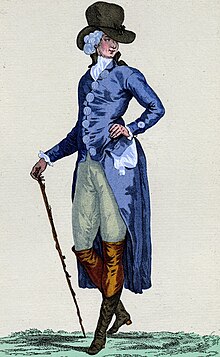
To put on airs, also give airs, put in airs, give yourself airs, is an English language idiom and a colloquial phrase meant to describe a person who acts superior, or one who behaves as if they are more important than others.
Origin
It is derived from the French word "air", meaning appearance, and was first used in the 1500s. Variations of the phrase were used throughout the 1700s. The phrase appears in the 1911 Dictionary of French and English by John Bellows. It appears under the entry for the French word poseur meaning to pose, and more specifically "poseur: a person who pretends to be what he or she is not: an affected or insincere person".
History
The phrase is derived from the French word "air" which meant appearance or look. The phrase has been in use since the 1500s. To "Give Airs" was also referred to as a fake way of acting. "Put on" is in modern emphatic use means: "to assume deceptively or falsely; to feign, affect or pretend."
The phrase appears in the records of the 1661 Witchcraft trial of Florence Newton. It was said that a woman named Mary Longdon, "...believed her position gave her the right to airs and graces".
It is considered an English Language idiom. The phrase was used in a published book from the 1700s, Put in Airs. The term was used in a book from 1759 by George Farquhar The Constant Couple "...when she puts on her airs, as you call it." The phrase appears also in 1776 in a book by Francis Beaumont called Humorous Lieutenant: "You can give yourself Airs sometimes..."
Amidst the United States Civil War, in 1864, a minstrel song (a genre now considered to be racially offensive) with a chorus and eight verses was published. It includes these lyrics: "Oh! white folks listen, will you now, this darkey's going to sing -.," and including two verses about personal vanity, followed by five on various Union Army's victories over the Confederacy, concluding: "Now where's this boasted chivalry, who sport the Stars and Bars? / Why they're learning from our Yankee boys the way to put on airs."
It has been variously defined as for example, in an 1869 textbook says: "Put on a counterfeit appearance" An 1882 dictionary says: "To put on airs, to assume airs of importance." Another more modern usage: "put on airs and graces to behave affectedly." Typified by false claims of mastery, superiority or pretense.
Putting on airs is an example of divergence behavior, that can be, acting in a contrary way to dissociate oneself from their peers. It is similar to acting boorishly at a wedding reception.
See also
- Colloquialism
- Dandy
- Delusions of grandeur
- Dude
- Flâneur
- Fop
- Gentleman
- God complex
- Highbrow
- Idiom
- Illusory superiority
- List of English-language idioms
- Messiah complex
- Pidgin
- Sophisticated
References
- ^ Ammer, Christine (2013) . The American Heritage Dictionary of Idioms (Paperback) (2nd ed.). Boston & New York: Houghton Mifflin Harcourt, Paw Prints. p. 174. ISBN 978-0-547-67658-6. 1439527245. Retrieved 4 October 2021.
- "put on airs". Dictionary Cambridge. Cambridge University Press. Retrieved 3 October 2021.
- "put on airs". The Free Dictionary. Farlex, Inc. Retrieved 3 October 2021.
- ^ "Putting on airs". The Book of Threes. 14 July 2017. Retrieved 3 October 2021.
- ^ Farquhar, George (1759). The Constant Couple. Edinburgh: The Exchange. p. 41. Retrieved 4 October 2021.
- Bellows, William (1911). Dictionary of French and English. New York: Henry Holt and Company. p. 466. Retrieved 4 October 2021.
- "Poseur". Merriam Webster Dictionary. 27 December 2023.
- ^ "Give Airs". The Idioms. Retrieved 3 October 2021.
- Put on. Vol. 2. Oxford University Press. 1971. p. 1651. Library of Congress 76-188038.
{{cite book}}:|work=ignored (help) - Locke, Tony (October 5, 2015). Irish Ghost Tales. History Press. p. 33. ISBN 9780750966658. Retrieved 4 October 2021.
- Beaumont, Francis; Fletcher, John (1776). Humorous Lieutenant. London: J. Tonson. p. 10. Retrieved 4 October 2021.
- "How to Put on Airs (Minstrel Song)". United States: n.p. 1864. OCLC 476542085.
- "Folks that Put on Airs". Good Old-times. Wehman Bros. 1914. p. 17.
- Ross, G.H. (1869). Text-book in the English Language for December 1869: Containing Addison's Spectator, Scott's Lay of the Last Minstrel, Byron's Prisoner of Chillon, and Full Notes Throughout. India: Sold for the Proprietor of the Madras Journal of Education, Madras Advertising and Printing Company. p. 63.
- Ogilvie, John; Annandale, Charles (1882). The Imperial Dictionary of the English Language: A Complete Encyclopedic Lexcon, Literary, Scientific and Technological. United Kingdom: Blackie & Son. p. 579.
- Feinstein, Jessica; Manser, Martin (2001). Heinemann English Dictionary. United Kingdom: Pearson Education. p. 19. ISBN 9780435104245.
- "Put on airs". vocabulary.com. Retrieved October 7, 2021.
put on airs: When you put on airs, you act like you're the master of something. If you wear a top hat and insist that everyone call you "sir" or "madam" while you boss them around, then you put on airs.
- To put on airs The Free Dictionary by Farlex
- Wardhaugh, Ronald (2010). An Introduction to Sociolinguistics (Paperback). United Kingdom: Wiley. p. 113. ISBN 9781405186681.